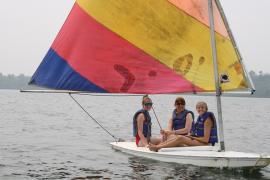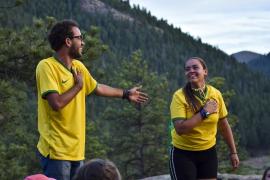An Insider's Look at Why NOT to Work at Camp
Not enough staff? You are not alone! While most of us agree on the many benefits of working at camp, the industry is struggling to find students who are eager, excited, and ready to work. You may ask yourself questions such as: Why don’t students want to work at our camp? What are the underlying issues that cause students to be so appalled by the idea of camp? OK . . . maybe appalling is a bit dramatic — but how can I make my facilities, programs, and overall offer more attractive to students? Let’s dive into the underlying issues that turn students away from camp and explore possible solutions to sway people to work at your camp this summer!
Honest Answers: Main Factors That Deter Us
Let’s jump in and learn: “What stops you from working at a camp?”
For many students, we simply are not aware of what camps offer, what the details of the job include, and how camps actually operate. If we never attended a camp as a child, all we can do is resort to hearsay and our own uninformed opinions. Give us the facts.
One of the major concerns is how big the commitment working at camp can be due to the fact that camp days are long or even 24/7. On top of this, we are tasked with the responsibility of helping better the lives of campers, while also carrying out the mission of your respective camp to the best of our ability. This is a hard sell because it requires a lot of responsibility at such an early stage in life. Do we really have to give up our phones? How do we stay in the know with our family, friends, and pets? It would be hard to be gone for two or three additional months! What? Day camp is an option? Had not thought of that!
Over the years the workforce has become more and more competitive, thus requiring companies to pay their employees more or they will leave for a job with better pay. This is another reason why college-age employees have hesitations toward working at camp. With such a competitive workforce, it may be hard to recruit students when other organizations can offer more money and potentially a better-looking job on a resume. We want our time to count, and we want to be paid what we are worth.
At the majority of camps, it is nature, all the time! Being in nature is something many people love, but working and living in such an environment can sometimes be too much. In some cases, there are scenarios where we would rather go to the “city” for dinner or enjoy entertainment outside of camp, and that is sometimes hard while working at a camp. Being outdoors and living with a group of people also takes away a lot of privacy; we are used to enjoying leisure time in our homes and the setting we choose. But when at camp the wildlife, environment or with whom a room is shared is out of our control. These issues are small when you look at them one by one, but combined can make a potential applicant feel intimidated and unsure.
Solutions to Get Our Attention
Be Real about What the Job Involves
If we have never been to a camp, we really do not know what a day would really look like. We don’t know if we ever get to leave camp, if we ever have breaks, or anything for that matter. Simply put, we don’t know how day, overnight, or summer camp jobs work. Give us the basics, the good and the bad.
Further tying into this idea, a “Visit Day” for interested future staff could be very beneficial to see first hand how the camp operates on a daily basis. When promoting camp jobs, be sure to include both day camps and resident camps as we might get interested in the overall idea of camp as a job and then determine which style of camp is right for us. Share the details of the work and of the rewards!
Pay Competitive Wages
Money talks. This is a phrase that will forever be true in our society, whether we like it or not! While camp is not a place where employees should have money as their top priority, it nevertheless is a major factor. Paying competitive wages, especially to college students, is essential to grabbing the attention of our generation. While money may not seem like a top priority to most students, the summer is one of the only uninterrupted times we have to make money. On top of that, most of us have 12 month leases, so even if we are not at school over the summer, we have bills to pay (cell phones, rent, utilities, etc).
If your budget is tight and you cannot afford to pay anymore than you are already offering, it may be important to consider how offers are being presented. For example, your offer would generally look more attractive to students if you present it as the full wage for the season, as opposed to a weekly wage (or both if you allow short season contracts). Providing and advertising bonuses on top of this seasonal wage will make the offer look even more appealing to students considering working for your camp.
Evaluate Reasonable Time off and Connection with the Outside World
The length of the time commitment is a major factor that turns so many students away from working at camp! For many, summer is the only time we have the opportunity to see family and friends back home. Restricting that opportunity for quality time with loved ones is a major downfall to some students, so offering flexible time off policies may help with students' interests for future employment.
Some strategies may include:
- Allow outside visitors at camp during time off
- Allow staff to leave camp during time off
- Give staff at least a full day each week for rest and fun activities
- Be reasonable and understanding on situations that may arise back home with clear communication about how much flex there can and can not be
- Establish a clear policy about the process for advanced communication of prior commitments
We want flexibility, and we also know the camp depends on people to run programs safely. Communication is key, and we all need quality rest in order to come back recharged.
Establish a Good Relationship with Staff
The marketing and application process is the first opportunity to establish a tone for the employee-management relationship. It is important to respond in a timely manner, answer questions asked and communicate a genuine interest in the potential applicant.
Consider a two-stage application process, something simple to get us in the door, and then follow up with a more detailed process once we have had a chance to form a connection. How seriously you take your work is communicated by how the application process is handled. We need to be able to trust you, but we are not really sure how to build it or read you as an employer until we have been able to spend time getting to know one another.
After all of these strategies have been implemented, you have finally successfully recruited students to come work at your camp. Congratulations! However, the job is just beginning!! Now is the time to continue building a good, fun, and healthy relationship between you and your new recruits. You don’t need to be friends with us, yet you can be friendly with us. Establishing a good relationship with your employees will go a long way and will help make issues that may arise in the future go much smoother.
Some ways to better build this employee-manager relationship include:
- Asking about the employee’s lives outside of camp
- Approaching constructive criticism situations with grace and understanding
- Finding the balance between being a friend and a manager
- Going out of your way to reward your employees for excellent work
- Any reward is good, no matter how big or small as long as it is genuine and meaningful
- Be open to the employees thoughts on certain situations
- Knowing that we are being listened to goes a long way towards our attitude towards management
We want to do well and need your support along the way. Knowing we are in this together and that we all want a successful camp helps us feel part of the team instead of being part of a machine.
Connect to the “Why”
In the end, for many of us, camp is a first “real” job. It is in a different environment from part-time jobs where we might clock in and out. It is also most likely the first time that someone’s life actually depends on how well we do our job. Set the tone for serious responsibility, train us how to do it (because we want to do well!), and help us make the reward visible so that we can connect to the bigger “why”. Help us see how what we do makes the difference for the campers, and we will be much more committed to our role in carrying out the mission of camp!
This blog was written on behalf of Project Real Job whose purpose is support camps in their efforts to recruit, hire, and retain staff.
Micah King intends to start a meaningful career, while Mitch Rhyne dreams of working as a community center leader. Both are juniors in Parks, Recreation & Tourism Management majors at Clemson University. Special thanks to other panelists Eric Seo, Kasey Coleman, Forest Davis-Clark, and our professors who selected us for this opportunity, Drs Joy James ([email protected]), Gwynn Powell ([email protected]), and Teresa Tucker ([email protected]).
The views and opinions expressed by contributors are their own and do not necessarily reflect the views of the American Camp Association or ACA employees.




